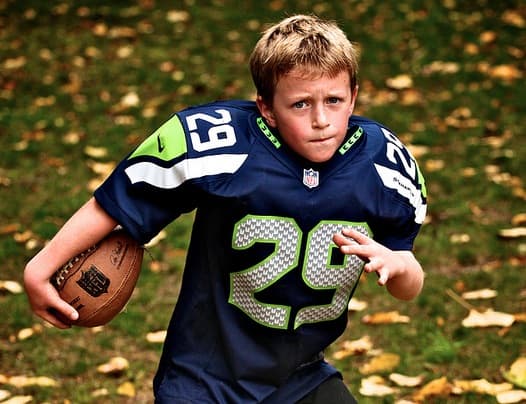Advertisement
New Podcast: Kids, Contact Sports And 'Getting Your Bell Rung'

If my son ever wants to play tackle football, my response will consist of four simple words: "Over my dead body." (With perhaps the addendum: "Your brain is too precious to turn it into swiss cheese.")
Thankfully, he has expressed no interest. But what if he did? And what about the concussion risks of other sports?
Happily, our regular CommonHealth contributors, Drs. Gene Beresin and Steven Schlozman, Massachusetts General Hospital child psychiatrists and excellent mental health communicators, have just created their first "What's On Your Mind?" podcast. And their five-minute conversation addresses this very topic: Should my kid play contact sports? The podcast series is part of their public outreach mission at the new Clay Center for Young Healthy Minds.
Listen to the full podcast here. How often do you get to hear one psychiatrist call another "a shrimp"? But mainly, the information comes from solid sources — the CDC, concussion experts — and the upshot is clear: Kids shouldn't start contact sports until age 14, according to the latest recommendations, because neck muscles get much stronger in adolescence and that helps protect the brain from impact. And the biggest takeaway: If a child take a significant head hit — if he "gets his bell rung," as Dr. Schlozman's football coach used to put it — he should be sure to sit out at least the rest of the game. Every concussion raises the risk for another concussion. When can he get back in? "Leave it up to their physician," Dr. Schlozman says.
But all these new findings and warnings about concussions do not mean kids should avoid sports altogether. "They're a huge part of growing up," says Dr. Schlozman, who, at age 12, wandered over and sat on the opposing team's bench after his own bell had been rung. "And as long as we're careful, there's no reason not to have fun."
From the blog post that accompanies the podcast:
That brings us back to the magic age 14 as a cut-off. Contrary to what most people think, 14 isn’t set aside for any major reason other than the fact that it’s the age where most boys have at least begun puberty. This is the recommendation of Dr. Cantu and Mark Hyman in their book, Concussions and Our Kids: America’s Leading Expert on How to Protect Young Athletes and Keep Sports Safe. In fact, the authors even suggest ignoring the age, and looking instead for signs of puberty in the child. That’s because puberty correlates strongly with having a stronger neck, and the stronger the neck, the less sloshing around your brain does when you take a hard hit. The neck absorbs the blow, and the brain stays steadier; the end result is protection against concussion. Think of this in evolutionary terms: we’re born with huge heads relative to other species—that’s because of our huge brains. However, our bodies tend to catch up to those heads around the onset of biological adolescence. Hence, 14 is the arbitrary cut-off, but it is based on the fact that most 14-year-old bodies can handle the brain that sits on top of them.
All of this brings us back to the initial controversy. What do you do if your child “gets her bell rung” in soccer or takes “a hard hit” to the head in football?
Here’s what the CDC has advised: it’s better to miss a game than a whole season. That is, in fact, the key message of a campaign by the CDC aimed at sports-related concussions. The CDC notes that the short-term effects of a concussion can generate additional problems that may plague a person throughout life. When young athletes have a flawed memory, they can have difficulty concentrating in school, relating to other kids, or sleeping well, and these problems therefore have long-term, devastating consequences.
Right now, as we wander through the gray zone of unclear official recommendations, the biggest danger occurs when athletes go back to the game before they fully recover from a concussion. In such a case, even a mild blow can cause second-impact syndrome, which can lead to brain swelling, brain damage, and even death. This is, of course, quite rare—high school football players aren’t dying in droves.
But why take the risk?
Parents, what are you seeing? Are kids really being kept out of games as long as they should be?
